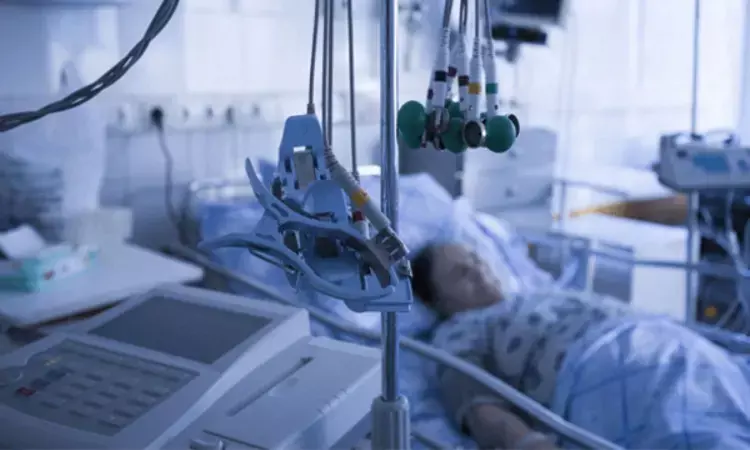- Home
- Medical news & Guidelines
- Anesthesiology
- Cardiology and CTVS
- Critical Care
- Dentistry
- Dermatology
- Diabetes and Endocrinology
- ENT
- Gastroenterology
- Medicine
- Nephrology
- Neurology
- Obstretics-Gynaecology
- Oncology
- Ophthalmology
- Orthopaedics
- Pediatrics-Neonatology
- Psychiatry
- Pulmonology
- Radiology
- Surgery
- Urology
- Laboratory Medicine
- Diet
- Nursing
- Paramedical
- Physiotherapy
- Health news
- Fact Check
- Bone Health Fact Check
- Brain Health Fact Check
- Cancer Related Fact Check
- Child Care Fact Check
- Dental and oral health fact check
- Diabetes and metabolic health fact check
- Diet and Nutrition Fact Check
- Eye and ENT Care Fact Check
- Fitness fact check
- Gut health fact check
- Heart health fact check
- Kidney health fact check
- Medical education fact check
- Men's health fact check
- Respiratory fact check
- Skin and hair care fact check
- Vaccine and Immunization fact check
- Women's health fact check
- AYUSH
- State News
- Andaman and Nicobar Islands
- Andhra Pradesh
- Arunachal Pradesh
- Assam
- Bihar
- Chandigarh
- Chattisgarh
- Dadra and Nagar Haveli
- Daman and Diu
- Delhi
- Goa
- Gujarat
- Haryana
- Himachal Pradesh
- Jammu & Kashmir
- Jharkhand
- Karnataka
- Kerala
- Ladakh
- Lakshadweep
- Madhya Pradesh
- Maharashtra
- Manipur
- Meghalaya
- Mizoram
- Nagaland
- Odisha
- Puducherry
- Punjab
- Rajasthan
- Sikkim
- Tamil Nadu
- Telangana
- Tripura
- Uttar Pradesh
- Uttrakhand
- West Bengal
- Medical Education
- Industry
Moderate hypothermia vs normothermia not tied to improved mortality in cardiogenic shock: JAMA

France: A recent study reveals that the early application of moderate hypothermia for 24 hours versus normothermia does not significantly increase survival in patients with cardiogenic shock receiving venoarterial ECMO. The study was published in the Journal of the American Medical Association (JAMA) on February 1, 2022.
"30-day mortality was not significantly lower in those treated with moderate hypothermia during venoarterial extracorporeal membrane oxygenation (ECMO) (42%) compared to those held at normothermia during ECMO (51%)," Bruno Levy, Université de Lorraine, Nancy, France, and the team wrote in their study. "Adverse events, such as nosocomial infections and bleeding, occurred at a similar rate in the hypothermia and normothermia groups, however, the hypothermia group required more RBC transfusions.
Dr. Levy and the team conducted the study with an objective to determine whether early use of moderate hypothermia (33-34 °C) compared with strict normothermia (36-37 °C) improves mortality in patients with cardiogenic shock receiving venoarterial ECMO.
For this purpose, they conducted a randomized clinical trial of patients who had been endotracheally intubated and were receiving venoarterial ECMO for cardiogenic shock for <6 hours. The study was set in the intensive care units at 20 French cardiac shock care centers between October 2016 and July 20. 374 were randomized out of 786 eligible patients to receive early moderate hypothermia (33-34 °C; n = 168) for 24 hours or strict normothermia (36-37 °C; n = 166). The primary outcome was mortality at 30 days.
Among the 374 randomized patients, 334 completed the trial (mean age, 58 years; 24% women) and were included in the primary analysis.
Following were the key findings of the study:
- At 30 days, 71 patients (42%) in the moderate hypothermia group had died vs 84 patients (51%) in the normothermia group (adjusted odds ratio, 0.71).
- For the composite outcome of death, heart transplant, escalation to left ventricular assist device implantation, or stroke at day 30, the adjusted odds ratio was 0.61 for the moderate hypothermia group compared with the normothermia group and the risk difference was −11.5%.
- Of the 31 secondary outcomes, 30 were inconclusive.
- The incidence of moderate or severe bleeding was 41% in the moderate hypothermia group vs 42% in the normothermia group.
- The incidence of infections was 52% in both groups.
- The incidence of bacteremia was 20% in the moderate hypothermia group vs 30% in the normothermia group.
"Our results showed that early application of moderate hypothermia for 24 hours did not significantly increase survival compared with normothermia in patients with refractory cardiogenic shock treated with venoarterial ECMO," wrote the authors. "However, because the 95% CI was wide and included a potentially important effect size, these findings should be considered inconclusive."
Reference:
Levy B, Girerd N, Amour J, et al. Effect of Moderate Hypothermia vs Normothermia on 30-Day Mortality in Patients With Cardiogenic Shock Receiving Venoarterial Extracorporeal Membrane Oxygenation: A Randomized Clinical Trial. JAMA. 2022;327(5):442–453. doi:10.1001/jama.2021.24776
Dr Kamal Kant Kohli-MBBS, DTCD- a chest specialist with more than 30 years of practice and a flair for writing clinical articles, Dr Kamal Kant Kohli joined Medical Dialogues as a Chief Editor of Medical News. Besides writing articles, as an editor, he proofreads and verifies all the medical content published on Medical Dialogues including those coming from journals, studies,medical conferences,guidelines etc. Email: drkohli@medicaldialogues.in. Contact no. 011-43720751


